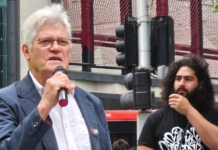
Malaita province in Solomon Islands is planning to poll people on self-determination.
It comes two weeks after a Malaitan-led protest against the national government in Honiara degenerated into a violent riot.
The Malaita Premier, Daniel Suidani, said he was seeking the help of the United Nations in the referendum, which he hoped to have completed by the end of January.
- READ MORE: Solomon Islands political battle ends with Sogavare winning confidence vote
- Solomon Islands PM survives no-confidence vote after unrest
- Other Solomon Islands crisis reports
Suidani said the UN was involved in drawing up the Townsville Peace Agreement in 2000, which was an attempt to resolve prolonged ethnic violence on Guadalcanal.
He said nothing had come from that agreement’s commitment to self-determination.
“The issue of independence or maybe a referendum is quite important because we need to find out whether that idea is still in the minds of the people of Malaita. That is why I am announcing this referendum to be carried out as soon as possible,” he said.
Earlier this week, Solomon Islands Prime Minister Manasseh Sogavare defeated a motion of no confidence in him by 32 votes to 15 with two abstentions.
It was moved by opposition leader Matthew Wale after major political unrest in the capital last month saw three days of rioting, looting and burning of businesses and properties in Honiara.
Sogavare said he would defend the principles of democracy and the rule of law no matter the cost.
In his first public statement since the vote, Sogavare said the Solomon Islands was a democratic country with a democratically-elected government and he did not resign because that would only bring the wrong message to future generations.
Where is the legislation?
The government is also being criticised for only passing one new law this year.
Opposition MP and member for East ‘Are’are Peter Kenilorea Jr said the only law the government had passed in Parliament this year was an amendment to the Telecommunications Act.
He said the government could not use the covid-19 pandemic as an excuse for not doing its job.
“Just this year Fiji passed 34 Acts. They had community transmission. They worked,” he said.
“Papua New Guinea had 15, and 43 last year. We cannot just leave our jobs just because of covid-19. We don’t even have community transmission.”
This article is republished under a community partnership agreement with RNZ.













































